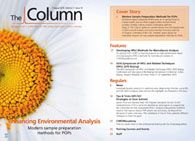43rd Symposium of HPLC and Related Techniques (HPLC 2015 Beijing)
The 43rd Symposium of HPLC and Related Techniques (HPLC 2015 Beijing Conference) will take place at the Beijing International Conference Centre, Beijing, People’s Republic of China, from 21–25 September 2015.
Photo Credit: Photography by Bobi/Getty Images

The whole word faces a number of challenges - such as quality control of drugs, the production and packaging of food, disinfection of drinking water, air pollution in large cities, and disease (including tumours and diabetes mellitus). High performance liquid-phase separations and related techniques are the core and paramount means to understand and to seek solutions to these issues. It is these and other topics that will be the focus of the HPLC 2015 Beijing Conference. Scientists from around the world - Canada, the United States, Netherlands, Switzerland, Germany, Turkey, Norway, Australia, Japan, South Korea, and China - will come together to present research highlighting recent advances in HPLC and related techniques. The programme includes the following highlights:
- Capillary Electrophoresis: Professor Dovichi from the University of Notre Dame (Indiana, USA) will present a study of deep bottomâup proteomics using capillary zone electrophoresis (CZE). Professor Sweedle from the University of Illinois at UrbanaâChampaign (Illinois, USA) will show single-cell analysis via high-throughput single cell mass spectrometry (MS) profiling and capillaryâbased separations. Professor Kennedy of the University of Michigan (Michigan, USA) will present the development and application of rapid electrophoretic and mass spectrometric assays as novel approaches to highâthroughput screening.
- Two-Dimensional LC: Professor Schoenmakers, from the University of Amsterdam (Amsterdam, The Netherlands), will review the “why, when, and how” of comprehensive 2D LC.
- Column Design: Professor Svec, at the E.O. Lawrence Berkeley National Laboratory (California, USA), will report the less common techniques using porous polymer monoliths. Professor Yeung from Iowa State University (Iowa, USA) will deepen our understanding of chromatography at fundamental levels using single molecule imaging and analysis.
- UHPLC: Professor Mary Wirth at the Purdue University (Indiana, USA) and Dr. Michael Dong from Genentech (San Fransisco, USA) will put emphasis on the understanding and applications of ultrahigh-performance liquid chromatography.
- Proteomics: Professor Yukui Zhang, an academician of the Chinese Academy of Sciences (Beijing, China), will talk about the latest progress in quantitative proteomics, and Professor Hanfa Zou, at the Dalian Institute of Chemical Physics at the Chinese Academy of Sciences, will present the recent work of his group on proteomics, but with an emphasis on protein modification. Professor Andy Tao, from Purdue University (Indiana, USA), will report specific isolation and detection of phosphorylation for proteomic analysis.
- Environmental Analysis: Professor X. Chris Le and Professor Xingfang Li, both from the University of Alberta (Alberta, Canada), will show their extraordinary contributions to the development of advanced analytical techniques and methods for solving issues in environmental health. Professor Le will emphasize the chemical species of heavily polluted metals and their fate in the environment and in organisms; Professor Li will discuss the disinfection of drinking water, an issue faced by global populations.
In addition to the general and parallel sessions packed with plenary, keynote, invited, and contributed talks, is the exposition where companies are invited to launch new products and showcase the latest instrumentation, software, and tools related to all types of liquid-phase separations.
E-mail: info@hplc2015-beijing.org
Website: www.hplc2015-beijing.org
This article was featured in LCGC's digital magazine The Column. Click here to view the full issue>>

















Investigating 3D-Printable Stationary Phases in Liquid Chromatography
May 7th 20253D printing technology has potential in chromatography, but a major challenge is developing materials with both high porosity and robust mechanical properties. Recently, scientists compared the separation performances of eight different 3D printable stationary phases.
Detecting Hyper-Fast Chromatographic Peaks Using Ion Mobility Spectrometry
May 6th 2025Ion mobility spectrometers can detect trace compounds quickly, though they can face various issues with detecting certain peaks. University of Hannover scientists created a new system for resolving hyper-fast gas chromatography (GC) peaks.
University of Oklahoma and UC Davis Researchers Probe Lipidomic Profiles with RP-LC–HRMS/MS
May 6th 2025A joint study between the University of Oklahoma Health Sciences Center (Oklahoma City, Oklahoma) and the UC Davis West Coast Metabolomics Center (Davis, California) identified differentially regulated lipids in type 2 diabetes (T2D) and obesity through the application of reversed-phase liquid chromatography-accurate mass tandem mass spectrometry (RP-LC-accurate MS/MS).
Investigating 3D-Printable Stationary Phases in Liquid Chromatography
May 7th 20253D printing technology has potential in chromatography, but a major challenge is developing materials with both high porosity and robust mechanical properties. Recently, scientists compared the separation performances of eight different 3D printable stationary phases.
Detecting Hyper-Fast Chromatographic Peaks Using Ion Mobility Spectrometry
May 6th 2025Ion mobility spectrometers can detect trace compounds quickly, though they can face various issues with detecting certain peaks. University of Hannover scientists created a new system for resolving hyper-fast gas chromatography (GC) peaks.
University of Oklahoma and UC Davis Researchers Probe Lipidomic Profiles with RP-LC–HRMS/MS
May 6th 2025A joint study between the University of Oklahoma Health Sciences Center (Oklahoma City, Oklahoma) and the UC Davis West Coast Metabolomics Center (Davis, California) identified differentially regulated lipids in type 2 diabetes (T2D) and obesity through the application of reversed-phase liquid chromatography-accurate mass tandem mass spectrometry (RP-LC-accurate MS/MS).
2 Commerce Drive
Cranbury, NJ 08512

.png&w=3840&q=75)

.png&w=3840&q=75)



.png&w=3840&q=75)



.png&w=3840&q=75)